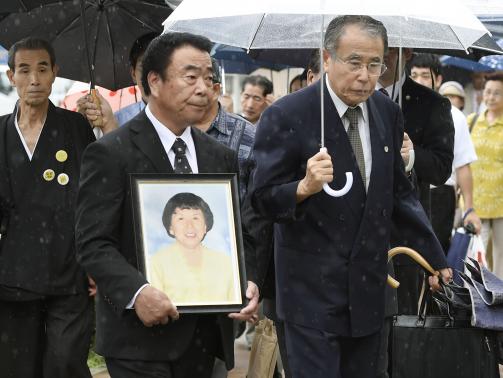
CREDIT: REUTERS/KYODO
(Reuters) – The operator of Japanese nuclear reactors that melted down in 2011 is responsible for the suicide of a woman who became depressed after the accident and it must pay $472,000 in compensation, a court ruled on Tuesday.
The surprise ruling could set a precedent for more claims for compensation in connection with the triple nuclear meltdown at the Fukushima Daiichi power plant north of Tokyo, which forced more than 150,000 people from their homes. About a third of them are still in temporary housing.
The lawsuit by Mikio Watanabe blamed Tokyo Electric Power Co Inc (9501.T) (Tepco) for the July 2011 death of his wife, Hamako, 58, who doused herself in kerosene and set herself on fire after falling into depression.
The couple was forced to flee from their home in the town of Yamakiya, 50 km (30 miles) from the plant as it spewed radiation into the air after it was hit by an earthquake and tsunami in March 2011.
The ruling is the latest blow for Tepco, which was bailed out with taxpayer funds in 2012 and had already expected to spend more than $48 billion in compensation for the disaster at its plant, on top of tens of billions or more in cleanup and decommissioning costs.
“This was an unqualified victory,” the plaintiffs’ lawyers said in a statement after the verdict.
“It will have huge implications for the compensation issue on nuclear power in the future.”
The district court in Fukushima ordered Tepco to pay 49 million yen ($472,000) in compensation to Watanabe, who had sought about 91 million yen in damages.
“We would like to deeply apologise again for the disruption and concern that the Fukushima Daiichi accident caused to many people, first and foremost the people of Fukushima,” Tepco said in a statement, although it did not say whether it would appeal against the verdict.
“We will study the verdict and respond in a sincere way,” it said.
“We pray that Hamako Watanabe has found peace.”
The nationalised utility has settled a number of suicide-related claims through a government dispute-resolution system, but it has declined to say how many or give details of how much it has paid.
A citizens’ judicial panel ruled last month that three former Tepco executives should face criminal charges over the disaster. Prosecutors have until October to respond to the panel, which can force the prosecutors to take up the case.
FIGHT WITH TEPCO
Watanabe, who had declined to settle out of court, quietly wiped his eyes with a plaid handkerchief as a court official read out the verdict.
“I am satisfied with the decision,” he told Reuters, adding that he believed his wife would be satisfied, too.
Toru Takeda, 73, a retired high school teacher from another radiation-affected town, travelled from his temporary home in Yamagata, in north Japan, to hear the court decision. Takeda is suing Tepco over his inability to return to his home.
“Our verdict will come next month from the same court, so, of course, we welcome this outcome,” he told Reuters.
The compensation was roughly comparable to sums awarded by district and high courts in several key cases over the past 20 years for work-related suicides or deaths linked to overwork. Six such cases produced a median award of 36 million yen, according to T-pec Corp, an occupational health consultancy.
Takeda said the legal battle, however, was one of principle, to ensure that Tepco was held responsible for the hardships that followed the Fukushima disaster, rather than for financial compensation.
“When I think of the children, I have to fight – with the country, with Tepco,” he said.
The court in Tuesday’s verdict accepted Watanabe’s contention that the nuclear disaster contributed to his wife’s suicide.
“The despair of the life of an evacuee with no prospects in sight and the psychological distress in choosing to die in the place where she was born and raised were extremely great,” it said.
Japan has made public 25 disaster-related death cases that were settled through the resolution system through last mont, some for more than 16 million yen. Causes of death were not always specified, and include those due to natural causes.
Suicides in Fukushima had been decreasing in the years before the disaster, but rose in the past two years even as nationwide suicides declined 11 percent between 2011 and 2013.
Since April 2011, there have been more than 1,500 suicides in the prefecture, more than 50 of which were determined to be “disaster related”.
Tepco’s shares and debt, which were battered in the wake of the Fukushima crisis and prolonged cleanup, have held largely steady in recent weeks and showed little reaction to the verdict. Tepco shares ended down 0.3 percent at 384 yen on Tuesday in a broadly weaker Tokyo market.







